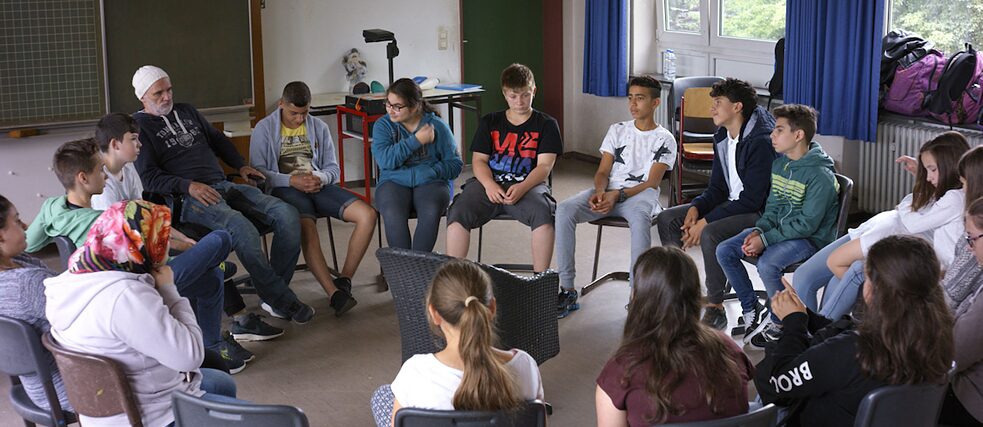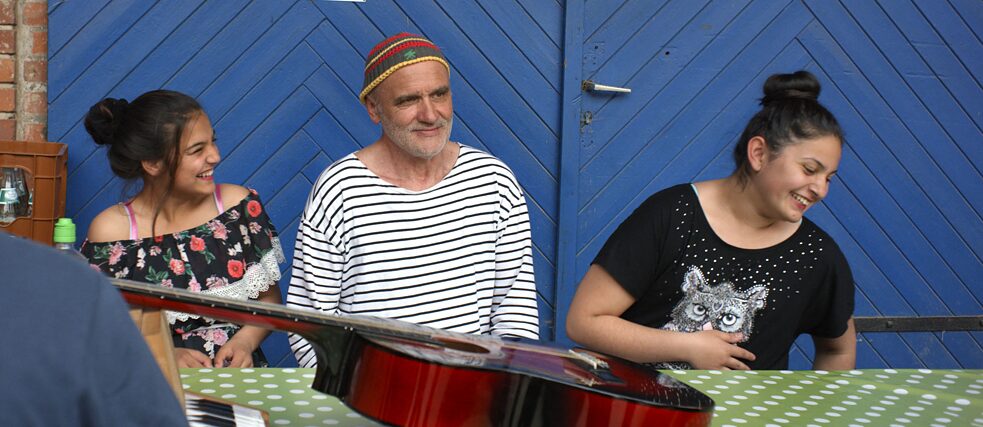Kinofest
Mr. Bachmann and his class

“If you have a wife, you have problems,” answers Hasan when asked why he didn’t want to get married later. “If you have a husband, you have problems,” Stefi responds visibly irritated by Hasan’s comment. No, this dialogue does not come from a discussion on the topic of “A New Wave of Feminism Against Toxic Masculinity in the Patriarchal System”, one which frequently takes place in Indonesia these days. This conversation between two teenagers at a school in Germany is taken from the film Herr Bachmann und seine Klasse (Mr. Bachmann and His Class). The documentary film might initially deter one or another viewer, since its 217 minutes is well above the average film length.
Unforgettable Moments in School
Watching the film revived bad memories of my own schooling from primary school to the beginning of my university studies. I can thank my teachers for most of these bad memories. There is hardly anyone from my school days who would have been able to leave a lasting impression on me. An exception is my kindergarten teacher in the Gayo Highlands (Aceh). Otherwise, I had bad experiences since elementary school. Once a teacher hit me with a wood ruler about a meter long until it broke in two.I also experienced humiliation in middle school, for example when a teacher ordered me to stand in front of the entire class and lift a table. When I attended high school, the deputy headmaster, who later became my class teacher, was the headmaster’s accomplice in trying to extort money from my father to allow me to attend the school at all just because I graduated from a middle school in another city. During my studies, a lecturer once commented on my hair, which I wore at the time nearly like Ed Sheeran today, but mine was a little longer and uncombed.
So when I watched the title character Herr Bachmann, who dresses more like an offbeat musician than a teacher, and how he treated his students, it was as if I had discovered an oasis. His relationship to his students and vice versa was heartfelt and respectful.
 © Madonnen Film
© Madonnen Film
More Complicated than Ever: My Life and My World as Teenagers
This film does not romanticize the appearance of a teacher whose style of education is different from that of other teachers. That fact is that Herr Bachmann’s entire class looks extraordinary and special. Musical instruments are always to be found in the classroom—even a drum kit—and the kids often use them during class so they don’t get bored. Above all, however, the film deals with the problems of between the ages of 12 and 14, their bittersweet teenage lives, and how to find their way through this increasingly complicated world. To make matters worse for them, they are children of immigrants who came to Germany from Turkey, Kazakhstan, Bulgaria, Romania or Morocco for a better future.Their difficulties are manifold: most of them do not yet speak fluent German (at the end of the movie, most of the protagonists get a D ), and some of them had to experience at a very young age what it means to feel out of place because they live in a country they do not yet know well.
Even as children, they are confronted with the question “Where is your home?” They answer with a gloomy face and tears in their eyes. “How can you call Morocco your home if you lived there for only two years?” asks a teacher in the film who also has a migration background.
In answering these questions, I had to think about the lives of those Indonesians who were unable to return to Indonesia after the events of September 1965 and the ensuing unrest. In our eyes, they led a happy, comfortable life because they were in Europe, as the example in the film Laskar Pelangi (The Rainbow Troop) shows. In reality, however, those in exile were lonely and longed for the “home” which, however, had rejected them.
Herr Bachmann und seine Klasse is set in Stadtallendorf, a village with a dark past. The Nazis built weapons factories and labor camps here. After World War II several factories, including a metal factory, continued to operate. Many guest workers from Turkey were recruited to work in the factory because too few Germans wanted to. This is why most of the pupils in Herr Bachmann’s class are the children of immigrants or migrant workers.
Seeing their parents work so very hard obviously also affects their visions of the future. Rabia, for example, when asked if she wanted to marry or have a partner one day, replied as follows: “I'll just work hard later. I don't know if I want to have a partner or not.”
A Documentary that Shows Emotions
Herr Bachmann und seine Klasse is an observational documentary film in the best sense. The director’s vision is expressed through strong imagery, and the plot is fanned out with careful editing. This is how we get to know Herr Bachmann and several of his pupils, who are the focus of the film. Thanks to the excellent editing, many surprises await us in the end, especially for those who are used to judging people according to their physical appearance and their religious background. For example, girls who we first experience as free-thinking feminists suddenly seem conservative when they talk about other topics. Or we realize that the boy who is good at boxing is sensitive and vulnerable. The film’s 217 minutes fly by. We are constantly curious to see which story will continue and how.The film Herr Bachmann und seine Klasse reminds me again why I love observational documentaries. We are there when they have simple but sincere conversations, which are basically more human. I’m sure that much of what we see in the film remains unimaginable for screenwriters of feature films. Body gestures, for instance, with which we involuntarily express our emotions are certainly perceived differently when “played” by actors. As cinephiles say, this film has a long “aftertaste”. Without being aware of it, we have long since fallen in love with the characters.